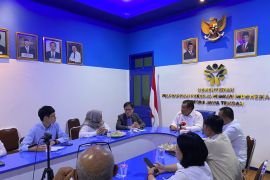
TPPO Police Task Force's presence being felt by public

Jakarta (ANTARA) - The Indonesian Police Strategic Studies Institute (Lemkapi) has assessed that the presence of the Human Trafficking Criminal Act (TPPO) Task Force of the Indonesian National Police (Polri) is starting to have an impact on the public.
Edi Hasibuan, Executive Director of Lemkapi, stated in a Friday statement that under Gen. Listyo Sigit Prabowo, Polri has successfully rescued over 1,500 victims and apprehended 550 suspects based on 460 complaint reports.
He emphasized that the swift action taken by the police in addressing TPPO cases demonstrates that their personnel are serving as servants, protectors, and helpers of the community. "The prompt efforts of the National Police at all levels in uncovering TPPO cases in various locations have undoubtedly brought reassurance to the community," he stated.
Hasibuan also noted that the task force has not only discovered incidents of human trafficking but also the illegal trade of human organs. He cited a recent example of the suspected illegal sale of human kidneys in Bekasi, West Java.
He acknowledged that disclosing cases of human trafficking and illegal organ trade has taken longer compared to other criminal cases. Hasibuan expressed hope that the Jakarta Police would continue conducting thorough investigations to uncover this case with utmost transparency.
Baca juga: Dua pelaku TPPO diringkus polisi Timor Tengah Selatan NTT
Baca juga: Kemen PPPA ajak aparat tangani kasus perempuan-anak harus berperspektif gender
Polri Chief Gen. Listyo Sigit Prabowo previously established the TPPO Task Force at both the central and regional levels. According to Inspector Gen. Sandi Nugroho, Head of the Polri Public Relations Division, the TPPO Task Force is led by the Deputy Head of the National Police's Criminal Investigation Agency at the central level, in addition to deputy heads of police at regional levels.
During the ASEAN Senior Officials Meeting for Transnational Crime (SOMTC) held in Yogyakarta on Tuesday (June 20), Prabowo raised the issue of TPPO as an effort to protect Indonesian citizens abroad. He also emphasized that cross-border cooperation involves not only the exchange of information but also the improvement of law enforcement through the arrest of perpetrators abroad.
Pewarta : Alviansyah Pasaribu, Cindy Frishanti Octavia
Editor:
I Komang Suparta
COPYRIGHT © ANTARA 2026









